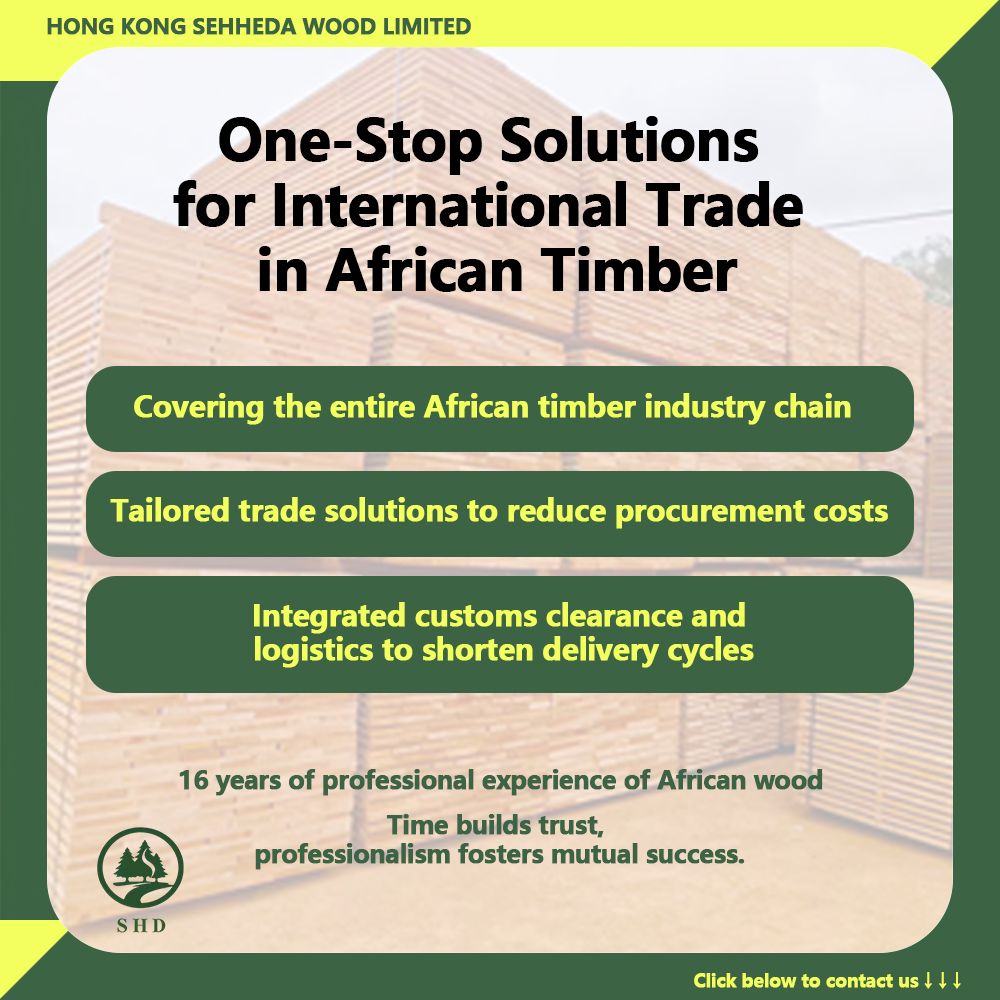Views: 231 Author: SENHEDA WOOD Publish Time: 2025-10-31 Origin: Site

The situation of African timber exports to Middle Eastern countries is complex, presenting both potential opportunities and multiple challenges. Below is a comprehensive analysis:
Demand Side: Differentiated Demand in the Middle Eastern Market
Stable demand for specific tree species: There remains sustained demand in the Middle East for tree species such as Iroko, Sapele, and Rosewood. Particularly in countries like the United Arab Emirates and Saudi Arabia, the demand for hardwoods is still supported by large-scale construction projects.
Impact of low-cost competition: Low-priced timbers such as Brazilian pine have entered the Middle Eastern market, creating a substitution effect on African timber and reducing the competitiveness of African timber in price-sensitive market segments.
Supply Side: Pressures Faced by African Producing Countries

Production constraints: Major timber-producing countries including Gabon and Cameroon have seen reduced logging and transportation efficiency due to the rainy season, keeping output at a low level. For instance, heavy rains in Cameroon have hindered road maintenance, causing transportation delays of up to 48 hours and backlogs in timber loading and shipping.
Rising costs: Increased transportation costs (e.g., the route from Okondja to Makokou in Gabon was paralyzed by rainfall, with transportation costs accounting for 28.5% of total costs), fuel shortages, and higher railway freight rates have pushed up timber export costs.
Policy impacts: Stricter compliance requirements for timber exports, such as the EU Timber Regulation and the Convention on International Trade in Endangered Species of Wild Fauna and Flora (CITES), have increased export costs and procedural complexity, restricting exports of some regulated tree species.

Market Dynamics: Coexistence of Competition and Substitution
Potential of emerging markets: As an emerging market, the Middle East still has room for growth in demand for African timber, especially in the high-end hardwood segment. However, it is necessary to address competition from low-cost timbers from countries like Brazil.
Insufficient order stability: Affected by factors such as regional conflicts and economic uncertainty, Middle Eastern buyers remain cautious in placing orders, leading to significant fluctuations in order volumes. For example, some countries have suspended purchases due to conflict concerns, resulting in uncertainties in timber trade.
Short-term challenges as the main focus: Currently, African timber exports to the Middle East face issues including weak demand, rising costs, and intensified competition, making the short-term situation relatively severe.
Long-term opportunities coexisting: If conflicts in the Middle East ease and the economy stabilizes, demand for timber in the region's construction and furniture industries may rebound. African timber enterprises can enhance their competitiveness by optimizing supply chains, improving product added value, and expanding high-end markets.

In summary, while African timber exports to Middle Eastern countries face pressures in the short term, there remains long-term potential for growth through strategy adjustments and adaptation to market demand.

HONG KONG SENHEDA WOOD LIMITED,we have been focusing on African wood business for 16 years ,Our variety include OKOUME, IROKO, SAPPELLY,ZEBRA, TALI, PADOUK, BOSSE, AZOBE, EYOUM,DABEMA, AFROMOSIA, TIAMA, OVANGOL, WENGE, KOSIPO, BILLINGA,TEAK,OKAN,etc.
our website:www.shdtimber.com
Whatsapp:+8613418472425
Unveiling Mashonaste Wood: The Hidden Gem of South American Timber
Professional Q&A on African Movingui Wood - Hong Kong Senheda Wood Limited
Worry-Free Cross-Border Timber Procurement: Choose SENHEDA WOOD
Umbila: Value Analysis And Application Guide of A Rare African Hardwood
Wenge Has Become A Star Material in The Global Timber Market
Balsamo Wood: Nature’s Timeless Masterpiece for Luxury Craftsmanship